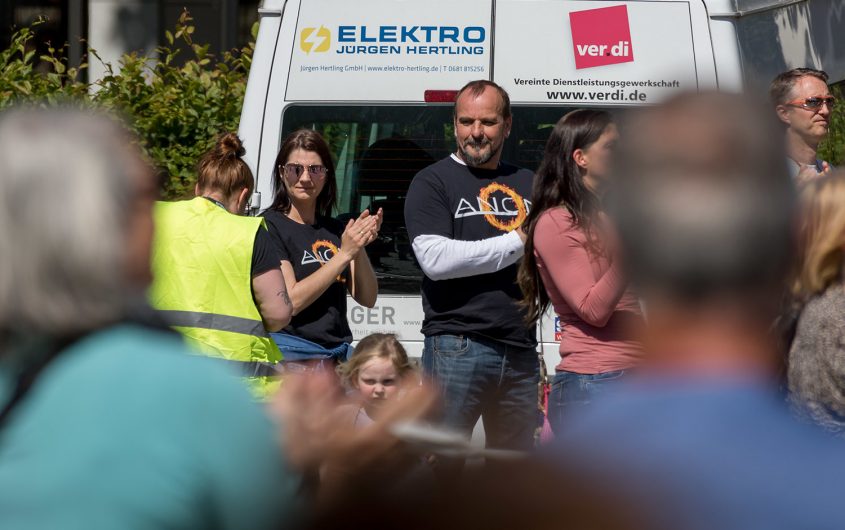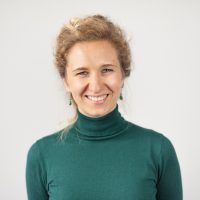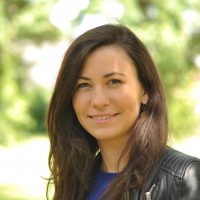
Kai Schwerdt via Flickr
QAnon Goes Global

Elizaveta Firsova
Institute for Didactics of Democracy
Elizaveta Firsova is a research associate and PhD student at the Institute for Didactics of Democracy at Leibniz University of Hanover. Ms. Firsova holds a Master of Arts in Education Studies from Freie Universität Berlin and has focused on the role of education in combatting social division, especially regarding immigrant communities. After her graduation, she worked for "PROOF: Media for Social Justice" in New York City, on curricula in the field of social justice. Currently, Ms. Firsova is a project coordinator for initiatives funded by the European Union to tackle social divisions on different levels. In one project, she focuses on bringing digital media literacy to schools with predominantly disadvantaged students, and in her second project, she is designing a program to target extremism and conspiracy theories in adult education institutions. In her PhD thesis, Ms. Firsova researches the impact of the Israeli-German youth exchange program on participants' political views regarding the Israeli-Palestinian conflict.

Teresa Eder
Program Director, Heinrich Böll Foundation Washington, DC
Teresa Eder joined the Heinrich Böll Foundation in 2022 and heads the program for Foreign & Security Policy in Washington, DC. The program focuses on strengthening transatlantic exchanges on issues of global peace & security, democracy, and human rights.
Previously, Teresa was a program associate at the Wilson Center’s Global Europe Program and worked as a journalist and TV-news producer for German TV ARD and ZDF in Washington, D.C., and as Deputy Head of the Foreign Desk for the Austrian newspaper “Der Standard” in Vienna. Her producing, writing, and research focused on transatlantic relations, political division, and issues of extremism & disinformation in the United States and Europe.
She holds a Master’s degree in International Relations from Georgetown University’s School of Foreign Service, a Master’s degree in Political Science from the University of Vienna, and a journalism degree from the University of Applied Sciences in Vienna.
“Please, Mr. President, make Germany great again.” It’s not every day that demonstrators in Germany plea for America’s president to come to their aid. But the August 29 anti-lockdown protest in Berlin featured no shortage of surprises.
Slogans like this are unlikely to transform perceptions of Donald Trump in Germany. They are instead evidence of a larger and more concerning trend: the rise of the QAnon conspiracy theory. This theory has gained a foothold in Germany and now boasts a global following. Its supporters are ready to take to the streets and share their beliefs with anyone who’s willing to listen.
The QAnon movement is potent and flexible. Its belief system encompasses a variety of other conspiracy theories, from JFK being alive to child trafficking rings run by famous celebrities. Given the long-standing antipathy toward America among anti-government groups in Germany, it would have been unthinkable until recently to hear calls for President Donald Trump to act as a savior in the fight against the presumed corona hoax. Anti-vaxxers are as susceptible as are far-right extremists to the popular narrative of a “deep state” that is secretly controlling our minds. In Berlin, these far-right groups adapted their “Reichskrieg” (Imperial War) flag and added Trump’s face and the popular hashtag #WWG1WGA (“Where We Go One, We Go All”).
QAnon has been in the American media spotlight for the past few months. The president’s retweets of QAnon accounts and implicit legitimization have put it at the center of today’s debates and fuel worries about the aftermath of the November election. But how did the QAnon movement, which in 2017 was still a fringe phenomenon, spread from the United States across the Atlantic into a completely different political context?
In Germany, QAnon appeared for the first time in late 2018. German researchers noted the hashtag #QAnon circulating on German social media, mostly in posts from sympathizers of the German far-right. Because of the low level of engagement, the hashtag lost traction. The interest in QAnon surged again in February 2020, when a far-right extremist murdered ten people and wounded five others in a racially motivated attack in the city of Hanau. In his manifesto, which he uploaded onto his own website, he cited several conspiracy theories that are closely connected to the QAnon movement.
Since the coronavirus pandemic hit Germany, all kinds of conspiracy theories have taken root and circulated among different groups. The implementation of strict measures to fight the pandemic sparked protests against the government. An estimated 32,500 to 43,000 protesters took part in Berlin. The diverse crowd of corona-skeptics and concerned citizens also included a visible number of QAnon followers. As with the over 100 anti-corona protests in Germany in the previous half year, the protestors showed their allegiance to QAnon through t-shirts and flags bearing “WWG1GWA” as well as performing QAnon-related chants.[1]
Despite QAnon’s recent surge in Germany—there are now more than 100,000 accounts following a QAnon YouTube channel—its full impact is difficult to gauge. The political and media environment in Germany suggest a different path for QAnon than in the United States. In contrast to the U.S., Germany has a multi-party system, lower levels of polarization, and broad support for public broadcasters. These trends suggest that QAnon won’t develop into a “mass movement.”
But that should not lessen concern about its appeal. Protest movements such as “Querdenken 771” and “Widerstand 2020” as well as the far-right “Reichsbürger” have been quick to integrate QAnon conspiracy theories into their agendas. Additionally, prominent public figures in Germany, including the soul and R&B singer Xavier Naidoo, the rapper Sido, and the celebrity vegan cook Attila Hildmann, share QAnon content on their own platforms and channels.
Defining QAnon
What started as a fringe phenomenon in the United States in October 2017 has grown into a global movement that some liken to a religious sect and others to a virtual game. QAnon followers take their “job” seriously and invest a lot of time researching and interpreting the so-called “QDrops” that appear online. QDrops are short, mostly cryptic messages that often convey a radical, anti-Semitic worldview and promote the idea that Donald Trump is the savior of regular American citizens against scheming political elites and the establishment.[2]
The first attempts to classify the QAnon movement have resulted in vastly different assessments. Jakob Guhl sees QAnon as an “umbrella” conspiracy theory that combines different conspiracy theories, including well-known anti-Semitic tropes from the far-right and far-left as well as esoteric anti-vaccination conspiracy theories and the anti-immigrant theory of a “Great Replacement” that warns of a white genocide. Adrienne LaFrance compares QAnon to the emergence of religious movements such as the Seventh-Day Adventists and Church of Jesus Christ of Latter-day Saints. Travis View emphasizes the gaming dimension of QAnon, which resembles an online paperchase game where the goal is to solve QDrops. The flexibility of QAnon to be a religion for one person and a game for another might also explain the diverse demographics of QAnon followers, who in the United States range from older white women to young TikTokers.
When looking at conspiracy theories and their “followers,” it is helpful to understand them in the context of overlapping individual, social, and political identities.[3] Conspiracy theories are attractive because they offer simple solutions to complex problems. These theories allow one to blame a small and identifiable group of people for turmoil in a society without resorting to abstract sociological and political categories. The QAnon movement runs counter to the usual patterns of conspiracy theories. In the view of QAnon believers, the world is not divided in a simple binary of “good vs. bad.” Its adherents push a convoluted narrative and entertain all sorts of connections to show that there is a grand plan steering society and politics.
Here to Stay
QAnon’s broad appeal suggests that its popularity will not wane in the event that Donald Trump loses the November election. With more and more GOP politicians in the United States peddling the conspiracy theory, QAnon is here to stay. A recent poll shows that one in three Republicans think that the QAnon “theory” is mostly true, and only 13 percent denounce it completely. In Germany, QAnon still seems to be a movement on the fringes of society, but it could spread into the mainstream faster than current analyses suggest. According to the most recent findings of the Konrad-Adenauer-Foundation, around 30 percent of Germans have at least a tendency to believe in conspiracy theories.
The movement unites people with all sorts of disparate world views from the alt-right, to evangelical, to left-wing, to anti-vaxxers and esoterics. Its broad tent renders QAnon a powerful force that threatens to erode democracies from within. Its ideological underpinnings, even if contradictory, should be seen for what they are: anti-Semitic, anti-democratic, and illiberal. The QAnon conspiracy theory exists not just in the realm of ideas; it has also led to acts of violence, as seen in America (Pizzagate, Hoover Dam) and Germany (Hanau, Halle). Left unchecked, the QAnon conspiracy will only grow more potent. It is the responsibility of governments and citizens to fight fantasy with fact and closely monitor the movement. At a time when tensions are already running high, democracies can ill afford to take a back seat to conspiracies.
The authors are currently participants in the AGI project on Social Divisions and Questions of Identity in Germany and the United States – a three-year-project funded by the Transatlantik-Programm der Bundesrepublik Deutschland aus Mitteln des European Recovery Program (ERP) des Bundesministerium für Wirtschaft und Energie (BMWi).
[1] See Carol Schaefer, “How Covid-19 spread QAnon in Germany,” Coda, June 19, 2020.
[2] See Gabriele Cosentino, “The Post-truth World Order,” Social Media and the Post-Truth World Order (Palgrave Pivot, 2020), p. 1-31.
[3] See Michael Butter and Peter Knight, Routledge Handbook of conspiracy theories (Abingdon/ New York: Routledge, 2020).









